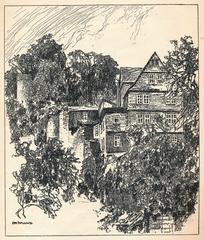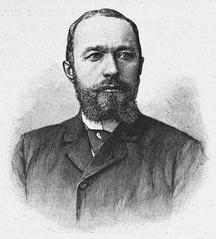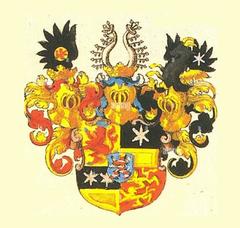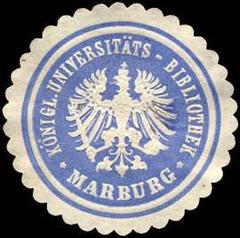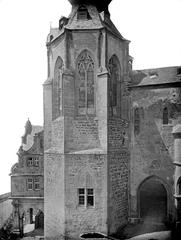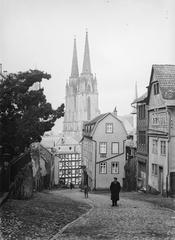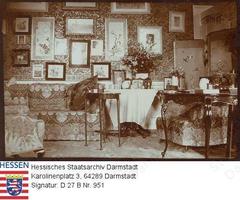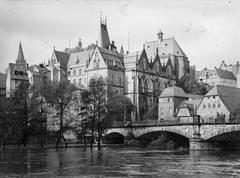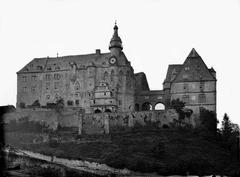Ethnological Collection of Philipps University Marburg: Visiting Guide, Tickets, and Hours
Date: 14/06/2025
Introduction
The Ethnological Collection of Philipps University Marburg is one of the oldest and most significant university ethnographic collections in Germany. It reflects centuries of scholarly dedication to the study and preservation of world cultures. Housed within historic spaces such as the Landgrafenschloss and university buildings, the collection offers a unique window into the material heritage of Africa, Asia, Oceania, and the Americas. With holdings ranging from ceremonial masks and textiles to archaeological finds and ritual objects, the collection serves both as a vital academic resource and an engaging destination for public visitors.
This comprehensive guide presents a clear overview of the collection’s history, core features, visiting information, accessibility, and opportunities for deeper engagement. Whether you are a researcher, student, or traveler exploring Marburg, you’ll find essential details here to make the most of your visit (Edufever; Springer Link; visitBerlin; Philipps University).
Contents
- Early Foundations and Institutional Context
- Growth and Development in the 19th Century
- Teaching and Research Significance
- Preservation through Turbulent Times
- Collection Highlights
- Collaborations and Exhibitions
- Research, Digitization, and Accessibility
- Ethical Stewardship and Future Perspectives
- Practical Visitor Information
- Visual and Media Resources
- Frequently Asked Questions (FAQ)
- Summary and Recommendations
- Sources and Further Reading
Early Foundations and Institutional Context
Founded in 1527, Philipps University Marburg has a long tradition of academic collecting and research. The Ethnological Collection emerged alongside other scientific collections during the 18th and 19th centuries, a period marked by systematic acquisition of objects for teaching and scholarly inquiry. These collections were developed to support research and public education, reflecting the intellectual curiosity of the era (Edufever).
Growth and Development in the 19th Century
The 19th century saw significant expansion of Marburg’s academic collections. The Ethnological Collection grew through academic expeditions, donations, and exchanges. Faculty and students contributed actively, bringing back objects from research trips abroad. These artifacts formed the basis for comparative studies in anthropology, archaeology, and related disciplines (Springer Link).
Teaching and Research Significance
From its inception, the Ethnological Collection has played a central role in the university’s teaching and research. It is used extensively in courses across anthropology, archaeology, and art history, offering students direct engagement with material culture. Researchers have utilized the collection for theses, dissertations, and scholarly publications, contributing to debates on classification, interpretation, and museum ethics.
Preservation through Turbulent Times
Despite the upheavals of the 20th century, including two World Wars, Marburg’s collections—thanks to careful stewardship and the city’s relative safety—survived largely intact. Post-war, the collection continued to expand, reflecting new academic interests and methodologies (Springer Link).
Collection Highlights
The collection encompasses over 30,000 objects from Africa, Asia, Oceania, and the Americas, with notable strengths in:
- West African Artifacts: Masks, sculptures, textiles, and ritual objects reflecting diverse traditions.
- Oceanic Items: Ceremonial and everyday objects from Polynesia, Melanesia, and Micronesia.
- Asian Textiles and Ceramics: Fabrics and porcelain from China, Japan, and Southeast Asia.
- Americas: Indigenous tools, clothing, and ceremonial pieces.
A significant photographic archive complements the objects, documenting fieldwork and expeditions from the early 20th century (Philipps University).
Collaborations and Exhibitions
The collection actively collaborates with national and regional museums, including the Humboldt Forum in Berlin. Recent exhibitions such as “Beyond the Norm? A Queer Look at Gender and Sexuality in the Ethnological Collection” have addressed contemporary issues of identity and representation (visitBerlin). Temporary exhibitions, often student-curated, provide fresh perspectives and public engagement.
Research, Digitization, and Accessibility
Ongoing digitization projects and provenance research increase accessibility and transparency, making objects available to a global audience. Digitized records, virtual tours, and online exhibitions support research and public education (Springer Link). Guided tours are available upon request, and the collection remains integral to university teaching and research.
Ethical Stewardship and Future Perspectives
The collection is engaged in critical discussions about provenance, restitution, and ethical stewardship. Efforts focus on transparency, collaboration with source communities, and the decolonization of museum practices, demonstrating a commitment to responsible and inclusive management.
Practical Visitor Information
Locations
- Main Showroom and Exhibitions: Department of Social and Cultural Anthropology, Deutschhausstraße 3, Marburg.
- Landgrafenschloss (Universitätsmuseum): Wilhelmsbau wing, historic castle above Marburg (Marburg City Portal).
Visiting Hours
- Department Showroom: Tuesday to Friday, 10:00 AM to 4:00 PM.
- Landgrafenschloss Museum: Hours may vary due to renovations; check the official website for updates.
Admission and Tickets
- Admission to the Ethnological Collection is free.
- Landgrafenschloss museum entry may require a ticket; discounts for students, seniors, and groups.
Guided Tours
- Available upon request; book in advance via the Department of Social and Cultural Anthropology.
Accessibility
- Most exhibitions are wheelchair accessible; ramps and assistance are available. Some castle areas have limited access—contact the museum for detailed information.
Getting There
- Marburg is accessible by train and bus; both locations are within walking distance of central transport hubs.
- Parking is available nearby, including designated spots for visitors with disabilities.
Additional Visitor Tips
- Combine your visit with nearby attractions such as the Museum of Religions and Marburg’s old town.
- Check the university’s website for current events, temporary exhibitions, and family-friendly activities.
Visual and Media Resources
High-quality images of key artifacts, virtual tours, and videos are available on the collection’s official website. Optimized alt tags and multimedia content enhance accessibility for online audiences.
Frequently Asked Questions (FAQ)
Q: What are the opening hours of the Ethnological Collection?
A: Tuesday to Friday, 10:00 AM to 4:00 PM for the Department showroom. Landgrafenschloss hours may vary—check online for updates.
Q: Is admission free?
A: Admission is free to the Ethnological Collection; museum entry fees may apply at the castle.
Q: How do I book a guided tour?
A: Contact the Department of Social and Cultural Anthropology in advance via email or phone.
Q: Is the collection accessible for people with disabilities?
A: Yes, most areas are accessible; some castle sections may have restrictions. Please inquire ahead for assistance.
Q: Can I take photographs inside the exhibitions?
A: Photography for personal use is generally allowed; check for restrictions on specific exhibits.
Summary and Visitor Recommendations
The Ethnological Collection at Philipps University Marburg stands as a testament to scholarly dedication and cultural stewardship. Its rich and diverse holdings, active research programs, and public engagement initiatives make it an essential destination for anyone interested in anthropology, history, or global cultures. Whether visiting as a tourist or researcher, you are invited to explore, learn, and reflect on the world’s ethnographic heritage (Marburg City Portal; Philipps University).
Stay updated on special events and exhibitions by visiting the official university website and following their social media channels. Enhance your visit with the Audiala app for guided tours and interactive content.
Sources and Further Reading
- Edufever, Philipps University of Marburg
- Springer Link, Academic Collections at Philipps University
- visitBerlin, Beyond the Norm? Queer Look at Gender and Sexuality in the Ethnological Collection
- Philipps University Marburg, Ethnographic Collection History
- Marburg City Portal, Landgrafenschloss Marburg
- Philipps University Marburg, Ethnological Collection News and Updates
